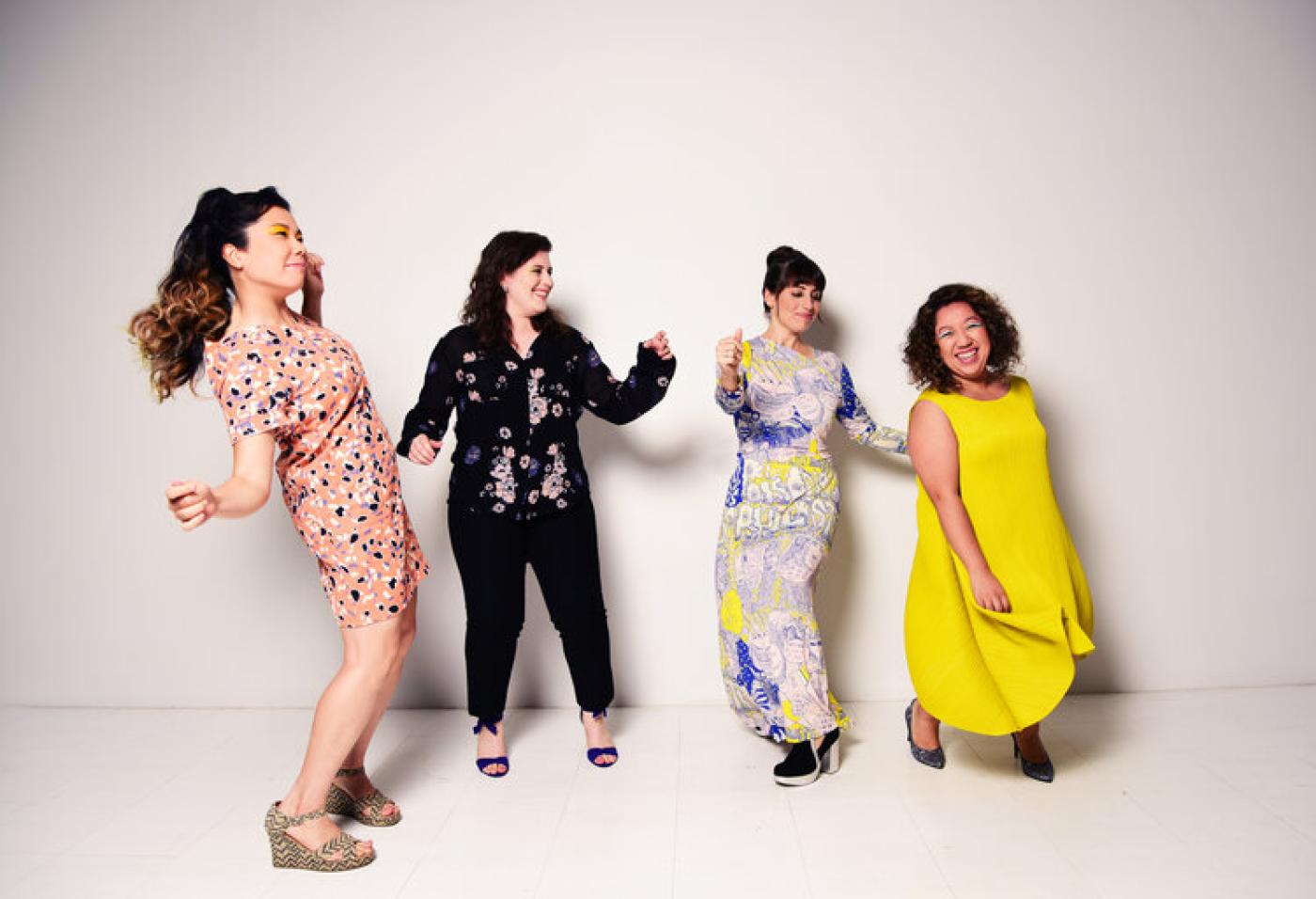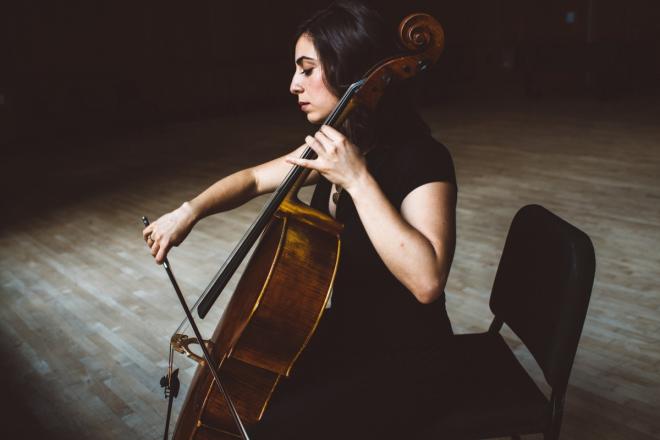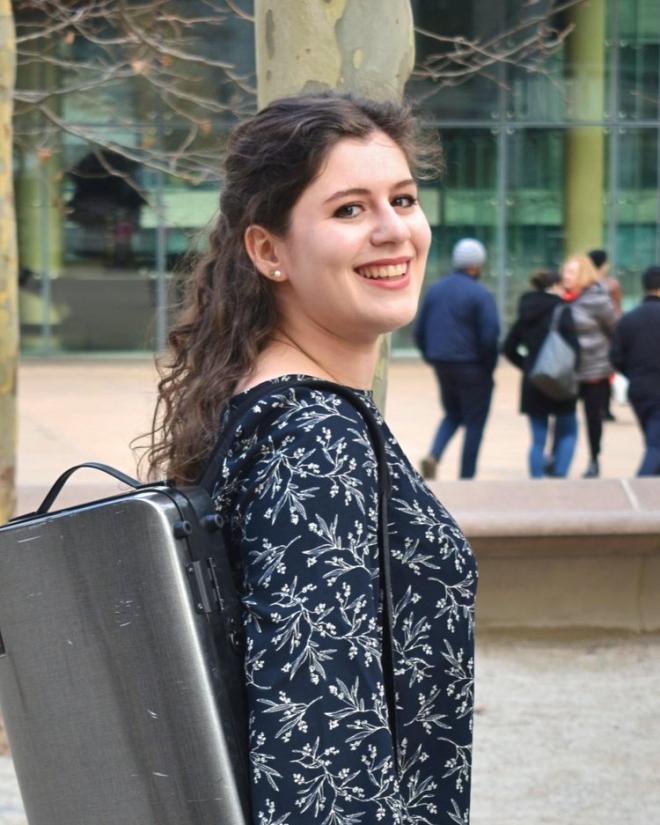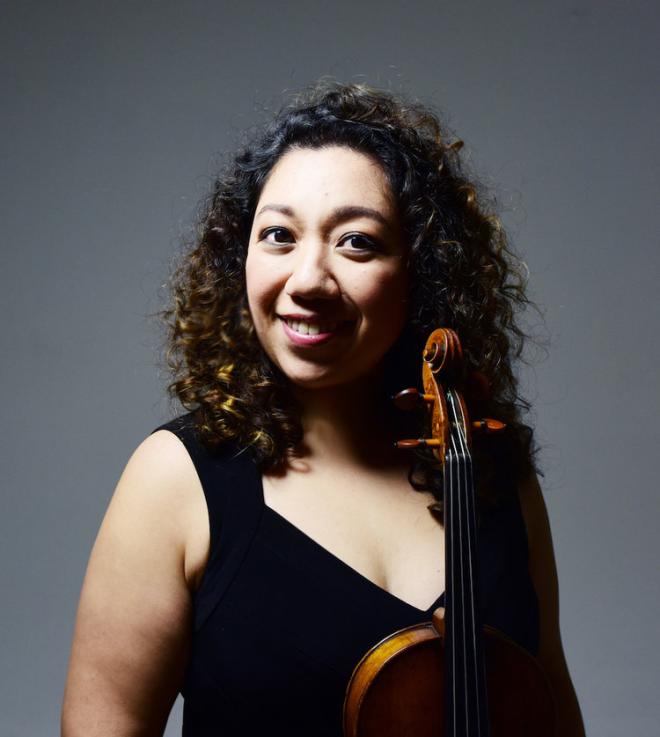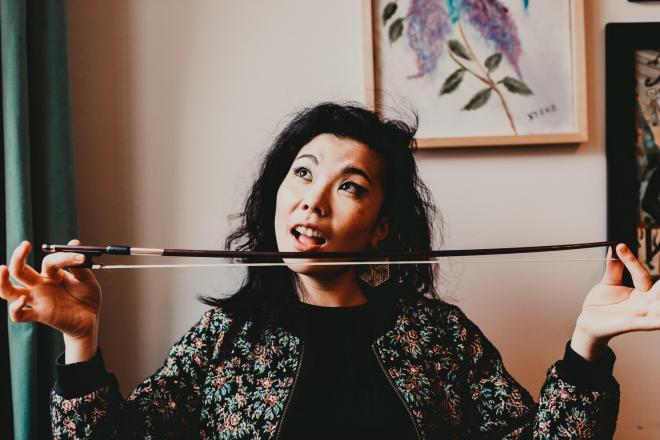On Saturday, December 17, the Aizuri Quartet will be performing their program Song Emerging at the Library of Congress's Coolidge Auditorium. The program begins with a new work written for the group by Shawn Jaeger, we were happy were we, which is described as a "swirling, magical game" on the quartet's website, based on the notes of the medieval hexachord and the Adagietto of Mahler's Fifth Symphony (which coincidentally was also discussed at length in one of our previous blog entries.) The program continues with the evening's only lengthy, multi-movement work, Quartet in a minor, op. 41 no. 1, by Robert Schumann, in which you can hear the composer's lyricism honed by his many excursions into romantic lieder and vocal music. The second half of the program is “The Aizuri Songbook”, a compilation of songs from the worlds of classical, folk and contemporary music, most of them in new arrangements commissioned for this program - not all of which are purely instrumental!
Karen Ouzounian (cello): All the Aizuris have rich, personal, and varied relationships to songs — whether it's singing Beatles songs with our families as children, falling in love with 19th century art song in college, or knowing all the words and nuances of the songs of Wilco, Radiohead and Bjork… Growing up within the Armenian diaspora in Canada, I sang a lot of Armenian music with my school choir, and to this day continue to sing all sorts of songs with my family at festive gatherings.
In the Aizuri Quartet we frequently use our voices to sing and demonstrate phrasing and sound ideas within our rehearsals, and we often approach our music-making vocally — so much of our repertoire calls upon us to sing through our string instruments! So devising the Aizuri Songbook felt like a natural extension of our musical inclinations and curiosities.
As we were developing the Aizuri Songbook, we each brought to the group songs that had deep personal meaning for us, but also songs that we thought would be exciting springboards for exploration for us. We wanted to dive into the potent, concentrated, intense and personal worlds and sounds of a variety of songs. There’s something really neat in discovering how a quartet might evoke Elizabeth Cotten’s style of guitar playing, or both the vocal and piano parts in 19th century art songs, or the harp in Joanna Newsom’s Bridges and Balloons… Each song has been an opportunity for us to learn and collaborate — we learned about Cotten’s incredible life through Freight Train; created some of our first in-house arrangements; and collaborated with so many wonderful composers and arrangers from within our musical community, each of whom brings a unique language for us to explore. For example, Anna Roberts-Gevalt’s original work, After Lester, invites us to interpret a unique, beautiful visual score. There’s something so moving and special about literally tapping into our voices and singing the words to Ben Russell’s Weather Vane, or Bridges and Balloons and Freight Train. And there’s a larger arc in the progression from song to song through the journey of the songbook (rather than the development of material within a large, single work, though that does exist in smaller scales within these songs!).
Emma Frucht (violin): When curating our Aizuri Songbook, we had to consider what the process of arranging vocal music for string quartet would be like. One of the main challenges we had to navigate was how to approach performing vocal music without including any words. We wanted to maintain the integrity, beauty, and essence of every song, while also highlighting the unique nature of our new instrumentation.
Karen sings two of the songs within our Songbook, Joanna Newsom’s “Bridges and Balloons,” and Elizabeth Cotten’s “Freight Train,” but the majority of the works within our set are performed as pure string quartet arrangements. Despite the words of these songs being absent from our performances, we strive for our interpretations to be deeply informed by the text of each song.
There’s something extremely special about translating the human voice to string instruments. For all four of us, over the years, our teachers always told us to try to “sing through our instruments.” Singing is such a personal form of expression. Our quartet is constantly trying to create direct connections between how we might sing a melody, and how we play it on our instruments. To give you an example, we try to take into consideration all of the different kinds of consonant and vowel sounds a word can have — if a word starts with a very hard consonant sound, we might add more articulation to the beginning of the note it corresponds to.
All of the songs we’ve included within our Songbook are extremely evocative; full of drama and a multitude of emotions. Each composer uses harmony, texture, and other musical characteristics to illustrate the text they’ve chosen for their work. We aim to highlight all of these elements within our interpretation, and hope to convey every composer’s message as vividly as possible.
Miho Saegusa (violin): We chose Robert Schumann's First String Quartet to be a part of Song Emerging because of the vocal qualities in his string writing. It's fun during the course of this quartet to be able to choose when to emphasize the vocal aspects of the music and when to enjoy moments when we can embrace our string instruments and the counterpoint. The slow movement is a beautiful song for the string quartet that's full of fantasy. In this piece, the juxtaposition of nearly symphonic writing on one hand and vulnerable intimacy on the other is exciting.
It's true that as a string quartet we usually play longer, multi-movement pieces like the Schumann. Sometimes a piece might be 30-40 minutes, or more. We would think about the kind of sonic and emotional journey we will take together, as performers and listeners. How would we pace the drama? How would we balance being in the moment while keeping an eye on the bigger scope of the movement or the whole piece? At times we also need to think about physical endurance. In contrast, we find songs to be both fascinating and a challenge because the story unfolds over the course of a few minutes and then it's over. In those minutes we can really go on quite the ride, and we need to capture the emotional essence immediately and as vividly as possible. In the Aizuri Songbook, we've been appreciating how each arranger translated "vocal line plus accompaniment" to the string quartet. There are many different approaches, and often we will navigate both roles during a song.
Ayane Kozasa (viola): Shawn’s piece was written for us so we were fortunate to be a part of the creation process from the very early stages of the piece. Ben [Russell]’s piece was written a few years ago for his group, ACME, but he changed the key to fit our vocals.
Our Songbook was an originally curated book consisting of some arrangements, some originals, and some newly made compositions. Once we had all the songs that were near and dear to our hearts, we started to create a setlist that we felt flowed together nicely. As for Shawn’s piece, we knew that he would be inspired by song (in this case, the Mahler Adagietto and the children’s exercise of learning a major scale), and so it fit the theme of our program well.
I think it always needs to be a balance between making sure a newer work has its moment to stand out within a program and also keeping in mind the show flow and the audience experience of the whole evening. It also depends on what the score requires of the performer: some pieces specify the type of venue that it should be played in. It’s always important to honor the vision of the composer I think, so we make sure we choose pieces and programs that both highlight the pieces and provides a thoughtful experience for concertgoers.
The Aizuri Quartet’s appearance is the Library of Congress’s annual Stradivari Anniversary Concert, in which the library’s famed collection of Stradivarius instruments are played by renowned artists, a tradition that began in 1935. Tickets are free but advance reservations are required.
PBS PASSPORT
Stream tens of thousands of hours of your PBS and local favorites with WETA+ and PBS Passport whenever and wherever you want. Catch up on a single episode or binge-watch full seasons before they air on TV.
